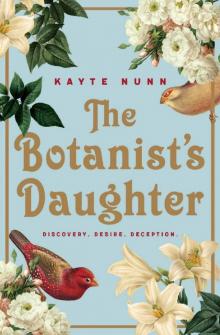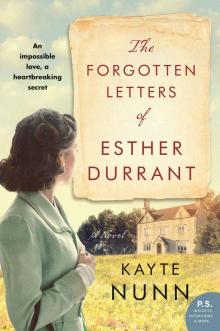- Home
- Kayte Nunn
The Botanist’s Daughter Page 32
The Botanist’s Daughter Read online
Page 32
‘Just through here, if you’d be so good as to wait. Dr Creswell will be with you shortly.’ The housekeeper’s vowels were rounded and friendly, much like her figure. She moved rather more swiftly than might be expected for one so large and fast disappeared, swallowed up by the gloom of the corridor.
They had been shown into the parlour, lit only by the glow of an oil lamp and a small fire burning in the grate. Esther sniffed, smelling wood smoke, a rich aroma that was infinitely preferable to the dusty, acrid coal that generally burned in London hearths. There was a large rug strewn with a faded flowered pattern and three wing-backed chairs upholstered in sombre olive green arranged to face the fire. A mahogany escritoire was pushed up against one wall and a large window looked out over the path upon which they had arrived. In a corner, next to a chaise longue, sat a rather impressive-looking gramophone, its fluted brass horn a bright and shiny flower in the shadowy room.
Esther perched on the edge of one of the chairs, set her handbag on the floor but kept her gloves in her hands, twisting them tightly together. John took the chair next to her, saying nothing. The clock in the hall ticked loudly, counting out the seconds as they sat. Time seemed to stretch, but in reality it must have only been a few minutes before the door burst open.
The man who came into the room was tall, with thick wavy brown hair, the shade of which reminded her of a newly shucked conker, unruly eyebrows matched his hair and he had a strong, square jaw. He was wearing a tweed jacket that hung off his spare, lanky frame and his trousers were the baggy corduroys of an off-duty farmer. The bowl of a briar pipe was firmly grasped in one hand. His cheeks were ruddy, as if he’d just that moment come in from a walk and he brought with him the sweet smell of gorse and tobacco. ‘Ah, there you are. Durrant, old man. How good to see you. Sorry to keep you waiting.’
It was his voice that captured her attention. Low and gentle, with a faint huskiness, like sandpaper. She’d never thought of herself as the kind of woman to be affected by something as simple as the timbre of a voice, but she could have closed her eyes and been lulled to sleep by it.
Esther and John both rose, and the man extended his hand to her husband. They shook hands with hearty familiarity.
‘This is my wife, Esther,’ said John, a protective arm at her back.
‘Indeed. Splendid,’ said the man. ‘A pleasure to meet you.’ He studied her as an art critic might examine a painting, his searing gaze quite at odds with his soft voice, and she felt almost flayed at his careful regard of her, as if he could see the blood pulse in her veins, could penetrate the dark, empty heart of her. She looked away, studying the floor.
‘Darling, this is my old friend Richard Creswell. We were at Radley together.’ John was unusually buoyant. She suspected it was to make up for her poor mood.
‘Rather a long time ago now, eh?’
Esther looked up and noticed that the doctor’s eyes – a light shade of blue that reminded her of swimming baths – crinkled at the edges when he smiled and his teeth were white and even.
She briefly touched her fingers to his – the lightest of contacts – and then huddled her arms tight around herself again, though they offered little protection from his unsettling gaze. She hadn’t had an appetite for society nor polite conversation for some time now, and had hardly spoken to a soul save for the daily woman, John and Teddy, and Nanny of course, for the past several months. She didn’t appreciate this situation being foisted upon her.
‘Welcome to Embers.’
‘Embers?’ she said faintly.
‘The house. It gets its name from the island. It was built around, oh, seventy years ago now. Apart from a couple of cottages on the westward shore, it’s the only dwelling. Must have been something of an effort to get the materials here and construct it, though it’s likely that some of them were the result of shipwreck bounty. Rumour has it that, in years past, islanders used to attach lanterns to the necks of their cows so that passing ships might mistake them for boats at anchor and be lured onto the rocks.’
‘A deadly harvest,’ said Esther, noting that he, however, appeared to relish the anecdote.
‘I suppose so. Apparently the original owner lived here by himself. A hermit of sorts,’ he continued. ‘Mad old fellow.’ Dr Creswell boomed a rich, deep laugh that was, Esther imagined, honed on schoolboy rugger fields and cavernous dining halls. It bounced off the room’s high ceilings, giving her the impression of boundless bonhomie and a welcome as warm as the fire. She relaxed her grip on her gloves. Perhaps this would not be the ordeal she imagined.
‘And is there a Mrs Creswell?’ Esther was shocked at her outspokenness and her curiosity; it seemed that she had lost her ability to make polite conversation, to interest herself in the superficial. She rather thought, however, that he wouldn’t be the kind of man who would mind.
‘Not one that would put up with me,’ he said with a generous smile that went some way to contradict his comment.
‘Richard has been here, what … nearly three years didn’t you say, old chap?’ John interjected.
‘About that,’ he replied, not explaining what had brought him there, nor what kept him on this bleak, windblown isle. ‘Now how about some tea? I expect you worked up something of a thirst on your walk up here, not to mention a chill. It’ll warm you right up.’ He clapped his hands together with enthusiasm. ‘There’s no sugar to spare, I’m afraid, though we do have Darjeeling – a gift from a grateful patient,’ he explained. As he was speaking, the door to the drawing room opened, and the housekeeper bustled in with a tray. ‘Ah, thank you Mrs Biggs,’ he said as she set it on the table before them.
Esther wondered idly what kind of patients would come all this way to see him. Or perhaps he had a practice on one of the larger islands they had passed on their journey here?
‘Shall I be mother?’ His voice interrupted her musings and Esther flinched.
‘Oh, I do beg your pardon.’ The doctor looked mortified and Esther felt almost sorry for him. ‘Slip of the tongue.’
She smiled thinly and felt a pang of longing for Teddy again, for the satin feel of his skin, and the way his thick blond hair lay flat to his scalp after a bath. He’d become quite a chatterbox in recent months, and spoke with a delightful lisp that charmed everyone who came across him. She still couldn’t understand why they hadn’t been able to bring him with them. It would be a very long week without him.
Dr Creswell busied himself pouring tea and then handing yellow-and-white flowered cups and saucers to John and herself. There was a matching plate on which three plain biscuits rested, but she had no desire for one. Her hand shook as she raised the china cup to her lips and she had to concentrate to avoid spilling it.
Dr Creswell and John began to reminisce about their schooldays and Esther was free to let her gaze wander about the room. It was spare, no extraneous decorative touches that the lady of the house might perhaps have brought, but scrupulously clean: not a mote of dust had been allowed to rest on the polished escritoire nor on the windowsills. Stacked next to the gramophone were a number of vinyl records. She recognised Prokofiev, Schumann, Delius, Satie. She had enjoyed concerts at the Royal Albert Hall, the London Symphony Orchestra, the summer Proms series, but there had been no such outings in the summer last gone by. Once, music had been a pleasure, filling the rooms of Frogmore, accompanying her afternoons, the background to quiet evenings at home after Teddy was in bed, but that had been many months ago, before … before …
She was wrenched back to the present by the realisation that Dr Creswell had asked her a question, had repeated it several times judging by the furrow between his eyebrows. ‘I beg your pardon,’ she said, the barest hint of apology in her voice. ‘My attention was elsewhere.’
She noticed John and the doctor exchange a look of understanding. Their complicity rankled, but good manners meant that she let it go unremarked.
‘No matter, Mrs Durrant. I was merely asking if you had a pleasant journey.’
‘Oh, oh, yes, I suppose.’ She glanced at her husband for confirmation. ‘The sleeper was more than adequate, though the boat journey left something to be desired,’ she said dryly. She put her cup down on the table and stood up. ‘A little air, if I may. I’m sorry, I feel rather dizzy all of a sudden.’ She walked towards the window and raised the sash. A gust of wind blew towards her and she leant into its chilly embrace, taking several deep breaths. After a moment she lowered the frame and turned back to them both, seeing Dr Creswell crumpling up a small piece of paper in his hand and depositing it in the pocket of his jacket. John didn’t seem to have noticed; he was looking at her with a mix of sorrow, regret and what seemed like relief. Even in her numb state, she was attuned to the way her husband treated her differently now. He said he didn’t blame her for what had happened, that it wasn’t her fault. Over and over he had said it, but she knew better than to believe him. After all, she blamed herself, so why shouldn’t he?
‘Finish your tea, darling. Before it gets cold.’
Esther nodded, but as she was about to return to her chair an old map, framed and hung on the wall, caught her eye. It showed a scatter of islands and at the bottom left a small boat being rowed by a serpent, and the words There be Dragons in flowing script.
‘Oh, take no notice of that,’ Richard laughed. ‘The dragons here became extinct a long time ago.’
Esther raised an eyebrow but sat down again, taking a deep draught of the now lukewarm tea. The dregs felt chalky on her tongue but that was nothing unusual – kettles coughed up limescale unless they were regularly cleaned. Perhaps the housekeeper wasn’t as efficient as she looked.
Dr Creswell and John moved on to the topic of the increasing London fogs and she sat back in the chair, letting the conversation swirl around her once more. Unaccountably sleepy, she leant her head back against the antimacassar and her eyelids fluttered closed. She felt almost as if she were in a fog herself.
As she drifted towards unconsciousness, her mind flickered back to the doll, muddy and abandoned, that she’d seen on the path. Should she have picked it up? Was there a child crying somewhere because they had lost their favourite toy? How could that be, on such a wild and remote island where no one save for the doctor and his housekeeper appeared to live? It was very curious indeed. She must remember to ask John about it.
If you would like to find out more about Hachette Australia, our authors, upcoming events and new releases you can visit our website or our social media channels:
hachette.com.au
HachetteAustralia
HachetteAus
HachetteAus
Copyright
Lines from Sonnet XVII by Pablo Neruda from 100 Love Sonnets: Cien Sonetos De Amor by Pablo Neruda, translated by Stephen Tapscott, Copyright © Pablo Neruda 1959 and Fundacion Pablo Neruda, Copyright © 1986 by the University of Texas Press. By permission of the University of Texas Press.
Published in Australia and New Zealand in 2018
by Hachette Australia
(an imprint of Hachette Australia Pty Limited)
Level 17 207 Kent Street Sydney NSW 2000
www.hachette.com.au
Copyright © Kayte Nunn 2018
This book is copyright. Apart from any fair dealing for the purposes of private study, research, criticism or review permitted under the Copyright Act 1968, no part may be stored or reproduced by any process without prior written permission. Enquiries should be made to the publisher.
978 0 7336 3938 8
978 0 7336 3939 5 (ebook edition)
Cover design by Christabella Designs
Cover photographs courtesy of Shutterstock

 The Botanist’s Daughter
The Botanist’s Daughter The Forgotten Letters of Esther Durrant
The Forgotten Letters of Esther Durrant Angel's Share
Angel's Share